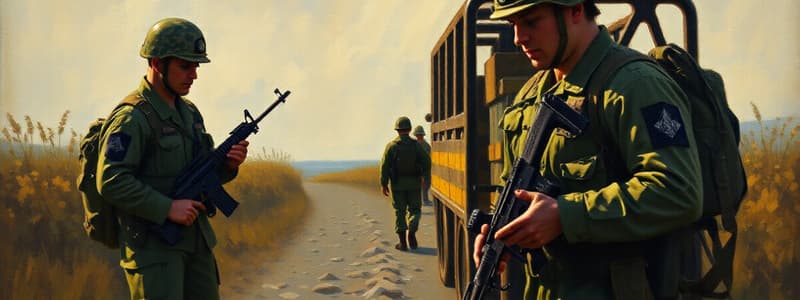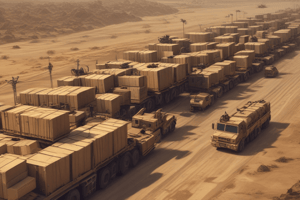Podcast
Questions and Answers
Proper coordination between different logistical units is not critical for effective logistics in modern warfare.
Proper coordination between different logistical units is not critical for effective logistics in modern warfare.
False (B)
Sustainment Support refers specifically to short-term logistical planning for discrete operations.
Sustainment Support refers specifically to short-term logistical planning for discrete operations.
False (B)
Weather conditions can significantly affect planning and executing logistics operations.
Weather conditions can significantly affect planning and executing logistics operations.
True (A)
Combat Support includes indirect assistance such as medical services.
Combat Support includes indirect assistance such as medical services.
Maintaining equipment is unimportant for logistical operations in military contexts.
Maintaining equipment is unimportant for logistical operations in military contexts.
International cooperation is unnecessary when addressing logistical challenges in warfare.
International cooperation is unnecessary when addressing logistical challenges in warfare.
Supply Chain Management involves monitoring and managing a complex array of logistics operations to prevent shortages.
Supply Chain Management involves monitoring and managing a complex array of logistics operations to prevent shortages.
Logistical operations are solely focused on the combat effectiveness of military forces.
Logistical operations are solely focused on the combat effectiveness of military forces.
Effective supply management includes the distribution of spare parts and ammunition.
Effective supply management includes the distribution of spare parts and ammunition.
The movement of troops is managed solely through air transportation.
The movement of troops is managed solely through air transportation.
Maintenance of equipment is a key function of Army logistics that includes repair and upgrades.
Maintenance of equipment is a key function of Army logistics that includes repair and upgrades.
Medical support in army logistics is limited to providing supplies to field hospitals.
Medical support in army logistics is limited to providing supplies to field hospitals.
Technology has a negligible impact on the efficiency of army logistics.
Technology has a negligible impact on the efficiency of army logistics.
Combat environment factors such as terrain and climate do not affect logistical planning.
Combat environment factors such as terrain and climate do not affect logistical planning.
Personnel services in army logistics include aspects like housing and education for soldiers.
Personnel services in army logistics include aspects like housing and education for soldiers.
Flashcards
Supply Management
Supply Management
The process of acquiring, storing, and distributing essential resources like food, fuel, ammunition, and spare parts.
Movement and Transportation
Movement and Transportation
Covers the movement of troops and equipment using various modes of transportation like road, rail, air, and sea.
Maintenance
Maintenance
Maintaining equipment and vehicles in working order, including repairs, servicing, and upgrades.
Medical Support
Medical Support
Signup and view all the flashcards
Communication and Information Systems
Communication and Information Systems
Signup and view all the flashcards
Personnel Services
Personnel Services
Signup and view all the flashcards
Construction and Engineering
Construction and Engineering
Signup and view all the flashcards
Combat Environment
Combat Environment
Signup and view all the flashcards
Forward Support
Forward Support
Signup and view all the flashcards
Base Support
Base Support
Signup and view all the flashcards
Sustainment Support
Sustainment Support
Signup and view all the flashcards
Combat Support
Combat Support
Signup and view all the flashcards
General Support
General Support
Signup and view all the flashcards
Security and Risk Management
Security and Risk Management
Signup and view all the flashcards
Coordination and Integration
Coordination and Integration
Signup and view all the flashcards
Time Sensitivity
Time Sensitivity
Signup and view all the flashcards
Study Notes
Introduction to Logistical Operations in the Army
- Logistical operations are the complex support systems that enable military forces to function effectively. They encompass a wide range of activities, from procuring and transporting supplies to maintaining equipment and providing medical care.
- These operations are crucial for ensuring that troops have the resources they need to accomplish their mission objectives.
- Without a robust logistical system, military operations would be severely hampered.
Key Functions of Army Logistics
- Supply Management: This function involves acquiring, storing, and distributing essential resources like food, fuel, ammunition, and spare parts.
- Movement and Transportation: Logistics manages the movement of troops and equipment, utilizing various modes of transportation (road, rail, air, sea).
- Maintenance: Maintaining equipment and vehicles is vital for operational readiness. This includes repair, servicing, and upgrades.
- Medical Support: Providing medical care to personnel and treating injuries are critical logistical functions. This includes field hospitals, medical supplies, and personnel.
- Communication and Information Systems: This area deals with the establishment and operation of communication systems across the operational theater.
- Personnel Services: This function supports the well-being of soldiers covering such matters as pay, personnel records, education, and housing.
- Construction and Engineering: This enables the construction of facilities, infrastructure and the execution of engineering tasks.
Factors Influencing Army Logistics
- Combat Environment: The operational environment significantly influences logistical planning. Factors like terrain, climate, and enemy activity play crucial roles.
- Operational Requirements: The scale of the military operation directly impacts the logistical needs. Large-scale deployments require extensive support systems, while smaller operations might need a more compact approach.
- Resources: Availability of funding, personnel, and equipment directly affects the efficiency and effectiveness of logistical operations.
- Technology: Technological advancements have had a profound impact on army logistics. Modern technology improves communication, tracking, and delivery systems.
- International Cooperation: In modern warfare, logistical challenges often transcend national boundaries, needing effective international partnerships.
- Security and Risk Management: Logistics considerations must include risk assessment to ensure safety during procurement, movement, and distribution of resources. This includes security of personnel and materials.
Types of Army Logistical Support
- Forward Support: This provides immediate supplies and support to troops at the front lines.
- Base Support: This covers the rear-area support facilities. This includes supply depots, repair shops, and personnel.
- Sustainment Support: This involves a long-term logistical plan covering the entire supply chain from origin to the troops.
- Combat Support: This encompasses direct support to combat units, such as artillery and aviation support.
- General Support: Broad support not directly related to the combat mission, such as communications and medical services.
Challenges in Army Logistics
- Security concerns: Protecting supplies from enemy action and ensuring safe transit is paramount.
- Coordination and Integration: Ensuring effective coordination between different logistical units is vital.
- Time Sensitivity: Logistical movement of supplies and resources often must be fast, precise, and accurate. This is a key factor in modern warfare.
- Weather: Natural events and severe weather conditions significantly impact the ability to plan and execute logistical operations.
- Maintaining Equipment: Adequate maintenance and repair are crucial for keeping equipment in optimal operational condition and avoiding costly downtime.
- Supply Chain Management: Monitoring and managing a complex supply chain require robust systems to avoid bottlenecks and shortages.
- Complexity: Maintaining and managing logistical operations is remarkably complex. Thousands of items, and hundreds or thousands of people are involved in a major operation.
Interdependence with Other Aspects of Military Operations
- Logistical operations are intrinsically linked with intelligence gathering, communications, and troop movements.
- Timely intelligence is crucial for accurate logistical planning.
- Reliable communication channels are necessary for keeping units informed and directing resources effectively.
- Smooth troop movement is reliant on efficient logistical support.
Studying That Suits You
Use AI to generate personalized quizzes and flashcards to suit your learning preferences.
Description
Explore the critical aspects of logistical operations in the army. This quiz covers supply management, transportation, and maintenance functions necessary for military effectiveness. Understand how robust logistics support successful operations and troop readiness.





